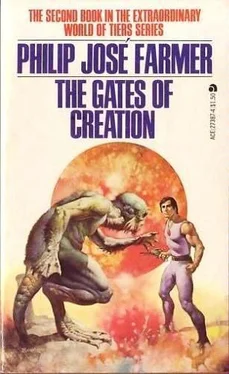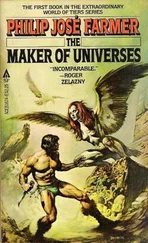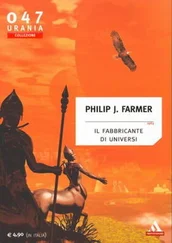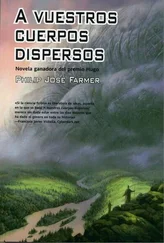The gliders dropped from their lifts, each towards the nest appointed to it. Wolff looked at the dark hordes advancing and lost some of his confidence in his beamer. Yet, the Ilmawir had beaten off attacks by the Nichiddor before—although with great loss. But never before had eight nests ringed the abuta.
A great-winged white bird passed overhead. Its cry came down to him, and he wondered if this could be an eye of Urizen. Was his father watching through the eyes and brains of these birds? If so, he was going to see a spectacle that would delight his bloody heart.
The Nichiddor, so thick they were a brown and black cloud, surrounded the island. Just out of bowrange, they stopped advancing and began to fly around the island. Around and around they flew, in an ever-diminishing circle. The Ilmawir archers, all males, waited for their chief to signal to fire. The women were armed with slings and stones, and they also waited.
Dugarnn, knowing that it would weaken them to spread out his people along the top of the walls, had concentrated them at the prow. There was nothing to prevent the Nichiddor from landing at the far end. However, they did not settle down there. They hated to walk on their weak legs.
Wolff looked out at the gliders. Some had dropped below his line of vision to attack the two nests below the underside. The others were coming down swiftly in a steep glide. A number of Nichiddor rose from the nest to meet them.
Two fliers passed over the nearest nest. Small objects, trailing smoke, dropped from them and fell on the nests. Females, flapping their wings, scrambled towards them. Then, there was an explosion. Smoke and fire billowed out. Another explosion followed.
The two gliders pulled up sharply. Carried upward by the momentum of their steep dives, they turned and came back for another and final pass. Again, their bombs hit. Fire spread through the dry plants and caught and enfolded some of the giant gas-cells. The females screamed so loudly they could be heard even above the wing-beatings and trumpetings of the circling horde. They rose from the burning nest, their infants clutched in their toes. The entire nest blew apart, catching some of the females, burning them in flight or hurling them head over heels. Infants dropped towards the sea below, their short wings ineffectively flapping.
Wolff saw one mother fold her wings and drop like a fish-hawk towards her infant. She caught it, beat her wings, and lifted slowly towards an untouched nest.
Two nests, burning and exploding, spun towards the ocean. By then several hundreds of males had detached themselves from the ring around the island. They flew after the gliders, which by now were far down, headed towards a landing on the waves.
The nests on a level with the island were out of range of his beamer. It was possible the two below might not be. Wolff told Dugarnn what he meant to do and went down a fifty-foot winding staircase to a hatch at its bottom. The nests there had risen close, and he caught both of them with a sweep of the full power of the beamer. They blew up with such violence that he was lifted and almost knocked off the platform. Smoke poured up through the hatch. Then, as it cleared away, he saw the flaming pieces of vegetation falling. The bodies of the children and females plummeted into the sea.
The male warriors from the nests were trying to get through the bottom hatches. Wolff put the beamer on half-power and cleared the area. Then he ran along the gangplank, stopping at every hatch to fire again. He accounted for at least a hundred attackers. Some had gotten through the defending abutal at the hatches at the far end. It took him a while to kill these, since he had to be careful not to touch the many great bladders. Even though he slew thirty, he could not get them all. The island was too large for him to cover all the bottom area.
By the time he climbed back up to the hatch, he found that the Nichiddor had launched their mass attack. This end of the island was a swirling, screeching, shouting, screaming mob. There were bodies everywhere.
The archers and slingers had taken a heavy toll of the first wave and a lighter toll of the second. Then the Nichiddor were upon them, and the battle became a melee. Although the winged men had no weapons other than their wings and feet, these were powerful. With a sweep of a wing, a Nichiddor could knock down an Ilmawir. He could then leap upon his stunned and bruised foe and tear at him with the heavy hooked clawlike toenails. The abutal defended themselves with spears, swords which were flat blades lined with shark’s teeth, and knives formed from a bamboolike surface plant.
Wolff methodically set about to kill all those in the neighborhood of the maindeck. The Lords had made a compact group, all facing outwards and slashing with their swords. Wolff took careful aim and slew the Nichiddor pressing them. A shadow fell on him, and he fell on his back and fired upwards. Two Nichiddor struck the deck on each side of him, the wing of one buffeting him. It covered him like a banner and stank of fish. He crawled out from under just in time to shoot two that had forced Dugarnn back against the wall. Dugarnn’s wife lay near him, her spear stuck in a winged man’s belly. Her face and breasts were ripped into shreds, and the Nichiddor who had done it was tearing out her belly. He fell backwards, his claws caught in her entrails, as Wolff shot him from behind.
For the next minute, it was near-death for him. At least two dozen Nichiddor came at him from all sides and from above. He spun like a top, using the beam as a spray, around him and in the air. The corpses, half-severed, smoking, stinking, piled up around him. Then he was over them, out in the open, on the fringes of the eddying battle. He shot everywhere and usually hit his target, though twice an abutal was borne by the thrust of the fight into the beam. This could not be helped; he was lucky that he had not hit more.
The Ilmawir, despite a fierce resistance, had lost half their numbers. Even with Wolff’s help, they were being defeated. The Nichiddor, despite casualties that should have made them retreat, refused to stop. They were intent on extermination of their foe, even if it meant near-extermination for them.
Wolff cleared the attackers around the Lords again. They were all on their feet and swinging their swords, although covered with blood. Wolff called to them to form around him. While they kept off the winged men, he would shoot over them. He stood upon a pile of Nichiddor, his feet braced on the slippery corpses, and coolly resumed firing. Suddenly, he realized that he was down to his last two power packs. He had hoped to save some for Urizen’s stronghold, but there was nothing he could do to conserve them now. If he did not use the beamer, he and all that fought with him would die.
Vala, standing just in front of him, yelled. He looked upward where she was pointing. A dark object spanned the skies: a black comet. It had appeared while all were intent upon the fight.
The abutal near them also looked up. They gave a cry of despair and threw down their weapons. Ignoring the winged men, they ran towards the nearest hatches. The Nichiddor, after searching the skies for the cause of the panic, also reacted with terror. They launched themselves into the air to get to the nests or to escape to the protecting underside of the island.
Wolff did not throw down his beamer, but he was as frenzied as the others in their attempt to get to the closest cover. Dugarnn had told him of the black comets that occasionally visited the space above this planet. He had warned of that which always accompanied the comet.
As Wolff raced towards a hatch, there were small whistling noises around him. Holes appeared in the foliage of the walls; little curls of smoke rose from the sheathing of the maindeck. A Nichiddor, ten feet up, flapping his fifty-foot wings frantically, screamed. He fell to the deck, his skin pierced in several places, smoke coming from one wing. Another and another winged man dropped, and with them some abutal. The corpses jerked with the impact of the tiny drops.
Читать дальше












